Mary Anne Yarde's Blog: The Coffee Pot Book Club , page 89
May 17, 2020
Check out Tony Riches' fabulous book — Katherine: Tudor Duchess (Brandon Trilogy #3) #HistoricalFiction #Tudors @tonyriches

Katherine: Tudor Duchess(Brandon Trilogy #3)By Tony Riches

Attractive, wealthy and influential, Katherine Willoughby is one of the most unusual ladies of the Tudor court. A favourite of King Henry VIII, Katherine knows all his six wives, his daughters Mary and Elizabeth and his son Edward.
When her father dies, Katherine becomes the ward of Tudor knight, Sir Charles Brandon. Her Spanish mother, Maria de Salinas, is Queen Catherine of Aragon’s lady in waiting, so it is a challenging time for them all when King Henry marries the enigmatic Anne Boleyn.
Following Anne’s dramatic downfall, Katherine marries Charles Brandon, and becomes Duchess of Suffolk at the age of fourteen. After the short reign of young Catherine Howard, and the tragic death of Jane Seymour, Katherine and Brandon are chosen to welcome Anna of Cleves as she arrives in England.
When the royal marriage is annulled, Katherine’s good friend, Catherine Parr becomes the king’s sixth wife, and they work to promote religious reform. Katherine’s young sons are tutored with the future king, Prince Edward, and become his friends, but when Edward dies his Catholic sister Mary is crowned queen. Katherine’s Protestant faith puts her family in great danger - from which there seems no escape.
Katherine’s remarkable true story continues the epic tale of the rise of the Tudors, which began with the best-selling Tudor trilogy and concludes with the reign of Queen Elizabeth I.
The Coffee Pot Book Club★★★★★ Highly RecommendedRead the full review HERE!
Pick up your copy ofKatherine: Tudor DuchessAmazon UK • Amazon US
Tony Riches
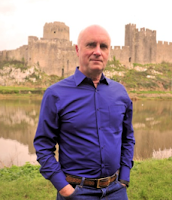 Tony Riches is a full-time UK author of best-selling historical fiction. He lives in Pembrokeshire, West Wales and is a specialist in the history of the Wars of the Roses and the lives of the early Tudors. Tony’s other published historical fiction novels include: Owen – Book One Of The Tudor Trilogy, Jasper – Book Two Of The Tudor Trilogy, Henry – Book Three Of The Tudor Trilogy, Mary – Tudor Princess, Brandon – Tudor Knight and The Secret Diary Of Eleanor Cobham. For more information about Tony’s books please visit his website tonyriches.com and his blog, The Writing Desk and find him on Facebook and Twitter.
Tony Riches is a full-time UK author of best-selling historical fiction. He lives in Pembrokeshire, West Wales and is a specialist in the history of the Wars of the Roses and the lives of the early Tudors. Tony’s other published historical fiction novels include: Owen – Book One Of The Tudor Trilogy, Jasper – Book Two Of The Tudor Trilogy, Henry – Book Three Of The Tudor Trilogy, Mary – Tudor Princess, Brandon – Tudor Knight and The Secret Diary Of Eleanor Cobham. For more information about Tony’s books please visit his website tonyriches.com and his blog, The Writing Desk and find him on Facebook and Twitter.
Published on May 17, 2020 20:00
May 13, 2020
Check out #HistoricalFiction author, Brook Allen's, fabulous book — Antonius: Second in Command (Antonius Trilogy, #2) #AncientRome @1BrookAllen

Antonius: Second in Command(Antonius Trilogy, #2)By Brook Allen

Having proven himself as a formidable cavalry commander, Marcus Antonius finally earns a position at his kinsman Julius Caesar’s side. However, Caesar is an exacting general, demanding complete allegiance from his staff, even when his decisions put him at odds with the Senate. Marcus’s loyalty to Caesar comes at a cost, and he soon finds himself embroiled in mob violence and military mutinies. As civil war brings Rome’s Republic crashing down, many a relationship is torn asunder, including Marcus’s marriage. Determined to rise triumphant in Rome’s new era, Marcus faces his fears, his failures, and his enemies—not the least of whom is himself.
Amid the crisis of the Ides of March, Marcus must don the mantle of ruthlessness to carve his own legacy in Rome’s history. Enemies have been made, wills have been read, and heirs proclaimed.
But in Rome’s civil unrest, blood answers only to blood.
The Coffee Pot Book Club★★★★★ Highly RecommendedRead the full review HERE!
Pick up your copy ofAntonius: Second in CommandAmazon UK • Amazon US
Brook Allen
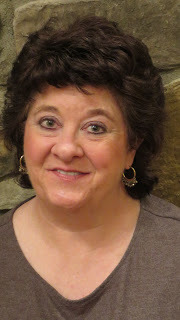 Brook Allen is a Music Educator in a rural community near Roanoke, VA. Aside from her regular classes, she teaches two ensembles, a Chorus and Recorder Consort. Born in Salt Lake City, UT, Brook was raised in Omaha, Nebraska and has lived all over the U.S., from the Pacific Northwest, all the way down to Florida. She graduated with a B.A. in Music Education and has a M. A. in Liberal Studies, with an emphasis on Roman History. Brook is happily married and has two energetic Labrador Retrievers. Voraciously active, she cycles, hikes, and loves to travel.
Brook Allen is a Music Educator in a rural community near Roanoke, VA. Aside from her regular classes, she teaches two ensembles, a Chorus and Recorder Consort. Born in Salt Lake City, UT, Brook was raised in Omaha, Nebraska and has lived all over the U.S., from the Pacific Northwest, all the way down to Florida. She graduated with a B.A. in Music Education and has a M. A. in Liberal Studies, with an emphasis on Roman History. Brook is happily married and has two energetic Labrador Retrievers. Voraciously active, she cycles, hikes, and loves to travel.Connect with Brook: Website • Twitter • Facebook.
Published on May 13, 2020 20:00
May 12, 2020
Let’s have a sneak peek between the covers of The Road to Liberation: Trials and Triumphs of WWII (A Collection) #HistoricalFiction #WW2 #BlogTour @JJToner_ya @MarionKummerow @marosikok

Liberation BerlinBy JJ Toner
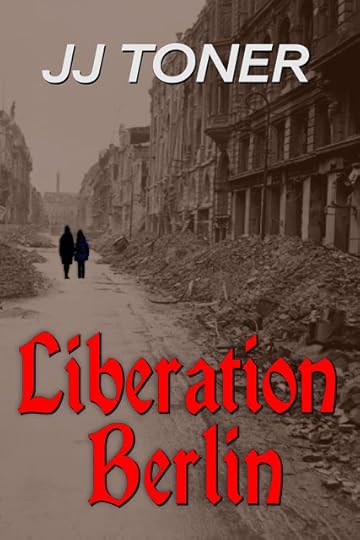
Let’s have a sneak peek between the covers of The Road to Liberation. Below is an excerpt of JJ Toner’s fabulous book — Liberation Berlin
Excerpt
Berlin, June 1957
Berlin was a city reborn. Military vehicles buzzed around streets populated with earnest young people, and construction cranes dominated the skyline.
The sun beamed down on a couple tending their crops on an allotment in Westend. A tall man in an ill-fitting suit approached. He had a paunch and walked with a slight limp.
The woman drew her husband’s attention to the stranger.
“Can I help you?” said the young man, brushing soil from his hands.
“This used to be my plot, before the war,” said the stranger.
“You left before the war?”
“I got out just before the end.”
“You were lucky, so,” said the young man. “What did you grow here?”
The older man smiled. “Potatoes, carrots and cabbages. And onions. Lots of onions. I had a cabin at the back, there.”
“There was no cabin when we took it,” said the woman.
The young man pointed to the lopsided shed. “I built that.”
The older man held out his hand. “My name is Hans Klein.”
The men shook hands.
“I’m Hermann Hübner. This is my wife, Carla.”
“We have carrots and onions,” said Frau Hübner. “And we thought we’d try peas.” “And we have this.” Hübner pointed with pride to a marrow under a cloche.
Frau Hübner stepped forward. “What did you say your name was?”
“Hans Klein.”
She and her husband exchanged a quick glance.
“We have something of yours,” he said.
She hurried into the shed and re-emerged with a tin box. She handed it to Klein. “This was buried in the plot. We found it when we started to dig.”
Klein took the box. He looked at it and frowned. “This is not mine.” “Look inside,” said the woman.
Berlin, early July 1944
Chapter 2
Gretchen settled Oskar in his chair, wrapping a light blanket around his legs.
“I’ll be home by one o’clock. There’s water on the table beside you, and I’ve left some food in the kitchen in case you feel hungry.”
He smiled his vacant smile at her.
Suppressing a tear, she kissed him on the forehead, picked up her bag and left.
She had always loved the early mornings. Even now, with destroyed buildings everywhere and mountains of rubble in the streets, the birds sang. There was a time when Oskar would have shared her joy in the birdsong. That was before the war took his mind. She clung to her memories of those good times as if they were the crown jewels.
Yesterday’s warmth radiated from the ground. Above the towering apartment blocks, the sunrise painted the clouds red in the eastern sky. She shivered. The magnificent sight was tinged with menace; the Red Army was advancing through Poland...
The walk to the bakery took twenty minutes. A couple of early delivery drays rattled past, but otherwise the streets were deserted. When she arrived, a queue of five women was already waiting at the bakery door. They greeted Gretchen as she entered. She knew all their names.
Bäckermeister Korn, the master baker, had fired up the ovens and was measuring out the ingredients into the hoppers.
“You’ve increased the rye?” she said, putting on her apron.
He ran a hand across his face, leaving a smudge of flour on his bulbous nose. “Our store of wheat flour is getting low. I’m not sure when we might expect the next delivery.”
She could remember when they’d first started increasing the quantities of rye in the mixture, in the winter of 1942. The levels were strictly controlled by the Gauleiter’s office.
“How much?”
“Don’t concern yourself, Gretchen.” He turned his back. “A little more than last month, that’s all.”
She let the subject drop, but she was concerned. The levels of rye affected her digestion. She had to eat the bread like everyone else, and she had to feed it to her sick husband.
***
By the time the oven doors were open and the four trays of Kommissbrot lay shimmering on the benches, Gretchen’s dress was stuck to her body and sweat was pouring down her legs. Outside, it was a hot day; inside the shop, the heat was unbearable. She ran her eyes over the bread. Did it look a little darker than usual or was that her imagination?
“Are you ready, Gretchen?” said the baker.
She gritted her teeth, running her hands down the creases in her dress. “Ready, Herr Korn.”
He opened the doors and the women flooded in waving their money and their ration books. Each person was entitled to 500 grams of bread, but not everyone would receive their allowance; there simply wasn’t enough for everybody. The scene quickly descended into chaos. The noise was deafening. Korn and Gretchen struggled to keep order. As the bread supply began to dwindle, the women fought more and more fiercely to get served. There were indignant shouts, cries of pain and anger as the women elbowed one another out of the way in frustration, pushing and shoving, using their handbags as weapons.
Those with the sharpest elbows, the most body weight or the loudest voices got to the front and were served; those at the back went away empty-handed.
Within 15 minutes all the bread was gone, apart from four loaves hidden in an oven – two Herr Korn had set aside for himself and two for Gretchen.
Herr Korn ushered the last disappointed customers out of the shop. “I’m sorry, ladies. That’s all we have today. Come early on Wednesday.” He locked the door.
Gretchen glanced at the large clock above the bakery door. It was after ten o’clock. If she didn’t leave soon, she would be late getting home. Oskar would start to fret.
“You’re free to go. I’ll tidy up,” said Korn. “How is Herr Schuster?”
“He’s much the same, Herr Korn.” She removed her apron, dusted the flour from her hands, and ran her fingers through her hair.
“Take the foal and give it to your husband with my blessing,” he said. The ‘foal’ was the wizened half-loaf made from the last few grams of dough.
She thanked him and placed the extra small loaf in her bag.
He unlocked the door. She stepped outside and he locked it again behind her. Shielding her eyes against the blinding light, she set off across the street.
A grey-green Kübelwagen shot past, forcing Gretchen to jump back onto the footpath. Stumbling to her knees, she bumped into a young woman pushing a pram and dropped her bag.
“I beg your pardon,” she said.
The young woman rolled her eyes. “Did you see who was in that car?”
Gretchen shook her head, picking herself off her knees.
“Two of the Gauleiter’s officers. I saw his crest on the door. They were going much too fast for safety—” The woman glanced down at Gretchen’s bag. “What do you have there?” “Nothing. It’s nothing.” Gretchen picked up her bag.
The young woman’s eyes lit up. “You have fresh bread. I can smell it.”
Gretchen hurried away to cries of “Wait! Come back!” from the young woman.A line of women waiting at a bus stop turned to watch as Gretchen hurried onward, her bag clutched tightly to her chest. The smell of fresh bread was enough to start a riot on the streets these days!
The Road to Liberation: Trials and Triumphs of WWIIA CollectionBy Marion Kummerow, Marina Osipova, Rachel Wesson, JJ Toner, Ellie Midwood, and Chrystyna Lucyk-Berger.
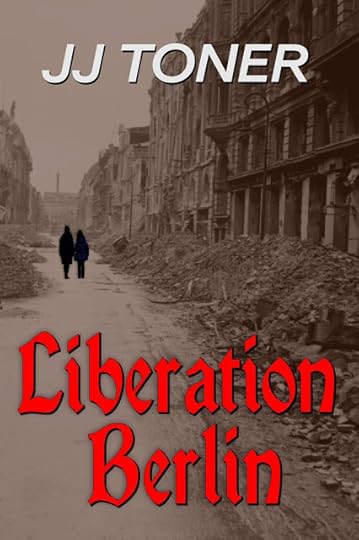
Riveting stories dedicated to celebrating the end of WWII.From USA Today, international bestselling and award-winning authors comes a collection filled with courage, betrayal, hardships and, ultimately, victory over some of the most oppressive rulers the world has ever encountered.By 1944, the Axis powers are fiercely holding on to their quickly shrinking territories.The stakes are high—on both sides:Liberators and oppressors face off in the final battles between good and evil. Only personal bravery and self-sacrifice will tip the scales when the world needs it most.Read about a small child finding unexpected friends amidst the cruelty of the concentration camps, an Auschwitz survivor working to capture a senior member of the SS, the revolt of a domestic servant hunted by the enemy, a young Jewish girl in a desperate plan to escape the Gestapo, the chaos that confused underground resistance fighters in the Soviet Union, and the difficult lives of a British family made up of displaced children..2020 marks 75 years since the world celebrated the end of WWII. These books will transport you across countries and continents during the final days, revealing the high price of freedom—and why it is still so necessary to “never forget”.
Stolen Childhood by Marion KummerowThe Aftermath by Ellie MidwoodWhen's Mummy coming? by Rachel WessonToo Many Wolves in the Local Woods by Marina OsipovaLiberation Berlin by JJ TonerMagda’s Mark by Chrystyna Lucyk-Berger
Pick up your copy ofThe Road to LiberationAmazon US • Amazon UK • Amazon CA
JJ Toner

My background is in Mathematics and computing, but I have been writing full time since 2005. I write short stories and novels. My novels include the bestselling WW2 spy story 'The Black Orchestra', and its three sequels, 'The Wings of the Eagle', 'A Postcard from Hamburg', and 'The Gingerbread Spy'.Many of my short stories have been published in mainstream magazines. Check out 'EGGS and Other Stories' - a collection of satirical SF stories. I was born in a cabbage patch in Ireland, and I still live here with my first wife, although a significant part of our extended family lives in Australia.
Marina Osipova

Marina Osipova was born in East Germany into a military family and grew up in Russia where she graduated from the Moscow State Institute of History and Archives. She also has a diploma as a German language translator from the Moscow State Institute of Foreign Languages. In Russia, she worked first in a scientific-technical institute as a translator then in a Government Ministry in the office of international relations, later for some Austrian firms. For seventeen years, she lived in the United States where she worked in a law firm. Eventually, she found her home in Austria. She is an award-winning author and a member of the Historical Novel Society.
Marion Kummerow

Marion Kummerow was born and raised in Germany, before she set out to "discover the world" and lived in various countries. In 1999 she returned to Germany and settled down in Munich where she's now living with her family.
After dipping her toes with non-fiction books, she finally tackled the project dear to her heart. UNRELENTING is the story about her grandparents, who belonged to the German resistance and fought against the Nazi regime. It's a book about resilience, love and the courage to stand up and do the right thing.
Rachel Wesson

Rachel Wesson is Irish born and bred. Drawn to reading from an early age, she started writing for publication a few years back. When she is not writing, Rachel likes to spend her time reading and playing with her three kids. Living in Dublin there are plenty of things to do, although the cowboys and Indians of her books rarely make an appearance. To chat with Rachel connect with her on Facebook - authorrachelwesson. To check out her newest releases sign up to her mailing list.
Ellie Midwood

Ellie Midwood is a USA Today bestselling and award-winning historical fiction author. She owes her interest in the history of the Second World War to her grandfather, Junior Sergeant in the 2nd Guards Tank Army of the First Belorussian Front, who began telling her about his experiences on the frontline when she was a young girl. Growing up, her interest in history only deepened and transformed from reading about the war to writing about it. After obtaining her BA in Linguistics, Ellie decided to make writing her full-time career and began working on her first full-length historical novel, "The Girl from Berlin." Ellie is continuously enriching her library with new research material and feeds her passion for WWII and Holocaust history by collecting rare memorabilia and documents.
In her free time, Ellie is a health-obsessed yoga enthusiast, neat freak, adventurer, Nazi Germany history expert, polyglot, philosopher, a proud Jew, and a doggie mama. Ellie lives in New York with her fiancé and their Chihuahua named Shark Bait.
Chrystyna Lucyk-Berger

Chrystyna Lucyk-Berger was born in Minnesota in 1969 and grew up in the culture-rich neighborhood of "Nordeast" Minneapolis. She started her writing career with short stories, travel narratives, worked as a journalist and then as a managing editor for a magazine publisher before jumping the editor's desk and pursuing her dreams of writing and traveling. In 2000, she moved to western Austria and established her own communications training company. In 2005, she self-published a historical narrative based on her relatives' personal histories and experiences in Ukraine during WWII. She has won several awards for her short stories and now primarily writes historical fiction. During a trip into northern Italy over the Reschen Pass, she stood on the edge of Reschen Lake and desperately wanted to understand how a 15th-century church tower ends up sticking out of the water. What stories were lying beneath? Some eight years later, she launched the "Reschen Valley" series with five books and a novella releasing between 2018 and 2021.For more on Chrystyna, dive in at inktreks(dot)com.
Published on May 12, 2020 23:00
Check out Isaac Samuel Miller's fabulous book — Just Get Up: And Manifest Your Inner Genius #Biography #SelfHelp
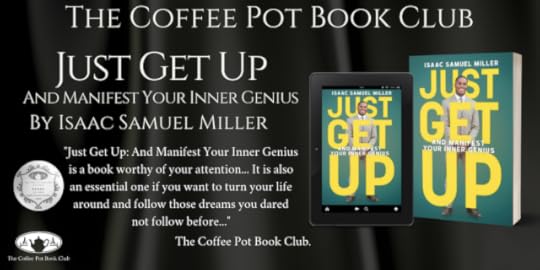
Just Get Up: And Manifest Your Inner GeniusBy Isaac Samuel Miller
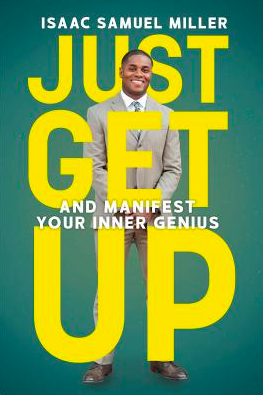
Abandoned by his father at the age of seven, Isaac Miller embarks upon a thirteen-year journey to fight his way out of a life of crime, drugs, mediocrity, and poverty.
Using his teenage imagination and work ethic as his guide, Isaac provides for his family, including his schizophrenic mother, and fights his way to becoming an entrepreneur at the age of seventeen.
Through his story, Isaac demonstrates how you can start with nothing and still live your dreams. Just Get Up teaches you how to capture your own life's dreams through exposing your inner genius. This guided tour of self-development will teach you how to unlock your life's true treasures. It will appeal to all people seeking a real-life inspirational story of overcoming adversities.
Along your journey you will find The Limelight Spot Effect, The 27-Month Plan, and The Octagon Way as you build your own success through his Just Get Up program. Isaac invites you to Just Get Up and tap into your unlimited potential as you discover your inner genius one chapter at a time.
The Coffee Pot Book Club
★★★★★
Highly Recommended
Read the full review HERE!
Pick up your copy ofJust Get Up:And Manifest Your Inner GeniusAmazon UK • Amazon US
Isaac Samuel Miller
 Isaac Samuel Miller is the author of Just Get Up: And Manifest Your Inner Genius and he has a collaborative book entitled, Experts & Influencers: The Leadership Edition. When Isaac turned 11 he was determined to provide for his sick mom and to escape poverty, so he set out on a journey to fight his way to success. Eventually this led to Isaac becoming an entrepreneur at 17 years of age. Isaac has over 13 years of experience as an entrepreneur and he works as a licensed strength & conditioning fitness trainer, sales coach, and a motivational speaker. Isaac has a bachelor's degree in therapeutic recreation & leisure studies along with a minor in physical education. Isaac is an active member in his community, he gives his time freely through preaching and delivering various bible discourses as a Minister. Isaac is a spoken word artist and he inspires people internationally with his spoken word piece entitled, Self-Belief. Isaac loves to inspire people and he invites the world to listen to his podcast entitled, JustGetUpWithIsaac for daily inspiration.
Isaac Samuel Miller is the author of Just Get Up: And Manifest Your Inner Genius and he has a collaborative book entitled, Experts & Influencers: The Leadership Edition. When Isaac turned 11 he was determined to provide for his sick mom and to escape poverty, so he set out on a journey to fight his way to success. Eventually this led to Isaac becoming an entrepreneur at 17 years of age. Isaac has over 13 years of experience as an entrepreneur and he works as a licensed strength & conditioning fitness trainer, sales coach, and a motivational speaker. Isaac has a bachelor's degree in therapeutic recreation & leisure studies along with a minor in physical education. Isaac is an active member in his community, he gives his time freely through preaching and delivering various bible discourses as a Minister. Isaac is a spoken word artist and he inspires people internationally with his spoken word piece entitled, Self-Belief. Isaac loves to inspire people and he invites the world to listen to his podcast entitled, JustGetUpWithIsaac for daily inspiration.
Published on May 12, 2020 20:00
May 11, 2020
#BookReview — Lucia's War by Susan Lanigan. #HistoricalFiction #WW1 #opera @susanl_author
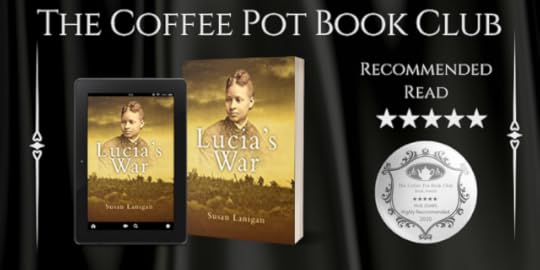
Lucia's WarBy Susan Lanigan
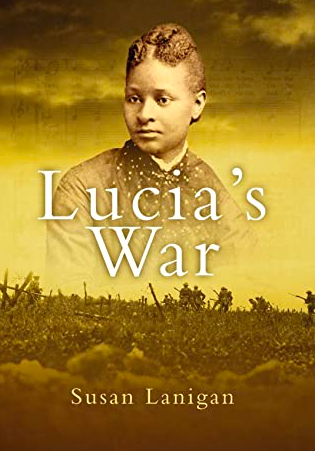
London, 1949.
Opera singer Lucia Percival is due to perform her last concert. But she has no intention of going onstage. A terrible secret from the First World War has finally caught up with her.
London, 1917.
Lucia, a young Jamaican exile, hopes to make it as a musician. But her past haunts her, and when she meets Lilian, an old woman damaged by war, she agrees to a pact that could destroy everything she has fought so hard for.
From the Western Front and Glasgow, to black society in London, Lucia’s story tells a tale of music, motherhood, loss and redemption.

"Did you know I once sang Wagner to a roomful of Nazis?"
It wasn't the most conventional way to start an interview with a music critic, but then, no one had ever called Lucia Percival conventional. And it wasn't as if this man's opinion mattered, for this was to be Lucia's last concert.
Of course, the Nazis had not realised that it was not an Aryan goddess singing behind the curtained booth. It was amusing when one thought about it. But that is all water under the bridge, at least, it should be. If only it were so easy to let one's past wash away with the current.
Everyone has secrets, stains upon their soul — that was what life did to you sometimes. However, the past had an awful habit of catching up with you when you least expect it. Better for Lucia to tell someone the whole story from her point of view before someone else did it for her…
From the dark, despairing depths of the Firth of Clyde to the glitter of the stage, Lucia's War by Susan Lanigan is the evocative story of a young Jamaican exile who dared to present herself to a world that was not ready for her.
With the passion of a subterranean fire desperate to explode into the world with a deafening crescendo that would forever shake the foundations of the earth, comes a story that would not seem out of place in one of Strauss' operas, Lucia's War is a novel that is as sensational as it is brilliant. With a lavish sense of flair, Lanigan throws her readers into a world of racial inequalities, where the colour of your skin mattered more than the colour of your soul, even if one did bleed the same colour red on the battlefield. It is a world of war and deprivation, broken promises, and disappointments. But above everything else, it is the story of a mother's love and the desperate desire to storm the music world, shake it to its very core, and show everyone that a young Jamaican exile had what it takes to become a superstar.
Oh, this book, where do I even begin? This is a story that swept me away in all of its brilliance. With soaring arpeggio's that scream of disaster and triumph seemingly in the same breath, Lucia's War is a novel that mesmerises. Lanigan has done the impossible and somehow weaved the language of music into this evocative story in such a way that it was almost as if I was listening to a poignant symphony that was as beautiful as it was violent.
The heroine of this story is the young Lucia Percival whose head is filled with music and dreams, and yet she faces the horrors of war, the abandonment by the man she loves, and the despairing loss of a child — a child she would have given up everything for. Lucia makes some bad decisions, but she is young, the world is at war and tomorrow isn't promised. However, despite her suffering, despite her loss, she can find some escape in her music. But even then, she is faced with almost insurmountable opposition because of the colour of her skin. Lucia fears that all her dreams will go up in ashes and fall like burnt confetti from the sky. I could not help but adore Lucia. She finds herself in some really impossible situations, and she makes the mistake of letting others dictate to her and tell her what to do. Although Lucia comes across as a very strong character, she really isn't. She is desperately unhappy and yearning for something that is always just out of reach. At times, the things Lucia has to go through really broke my heart and I found myself reaching for the tissues. Lucia's story is so poignantly tragic, but then the best operas are.
There are several secondary characters to this story, and they all bring something bittersweet to the narrative, but as well as that they help Lanigan depict the very essence of the era. Eva Downey's story is desperately tragic — how I cried for this character. The guilt she feels at giving the love of her life a white feather during the war means she is dying a death more agonising then he did. I feared for Eva's wellbeing on more than one occasions. She is this wonderful young lady whose dreams died the day Christopher did. Eva is a direct contrast to Lucia who, despite her grief, is still daring to dream — Eva got off that particular train a long time ago. I thought Eva was beautifully portrayed.
The men in Lucia's life do not come away from their relationship with her unscathed. Robin Mackenzie loves where he should not, he is white, Lucia is coloured, and unfortunately, society dictated that the two of them had no business together, even though they were so well suited. I think Lucia would have had a very happy life with him in another time and another place, and that knowledge is heart-breaking. I thought Robin's depiction was fabulous. He is broken by the end of this novel all because he could not love where he wanted.
The other man in Lucia's life is the dashingly handsome composer, Arthur Rosewell. Unlike with Robin, there are no racial barriers to him and Lucia being together, but there are emotional ones. There is also a sense of a shadow of a love triangle between Lucia, Arthur and Robin, which none of them can seemingly escape from. Arthur is a very honourable man, and he wants Lucia to succeed. However, he wants it on his terms, and that was never going to happen. I think by contrasting the two very different men, Lanigan shows the readers the despair that comes from loving a woman who marches to a beat only she can hear.
We do meet some historical characters in this book, most notably the Irish poet, W. B. Yeats, but it is the attention to the historical detail where Lanigan excels. Like all gifted historical fiction authors, Lanigan has portrayed the era this book is set in seemingly without any effort. This is incredibly hard to pull off, but Lanigan has done it most admirably. The hours of research that have so obviously gone into this book is staggering, but it was so worth it. Bravo, Ms Lanigan.
Lucia's War by Susan Lanigan is an exceptional work of scholarship. It is in all ways a historical fiction masterpiece. This is a book that is deserving of your time.
I Highly Recommend.
Review by Mary Anne Yarde.The Coffee Pot Book Club.
Pre-order your copy ofLucia's WarAmazon UK • Amazon US
*Released on June 1st 2020
Susan Lanigan
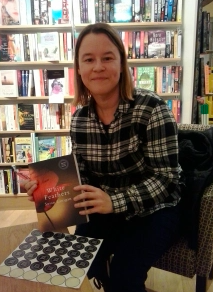 Susan Lanigan graduated from Trinity College Dublin with a degree in English and History in the late 90s, then pursued a Graduate Diploma in I.T. in Dublin City University and a Masters in Writing in NUI Galway.Susan’s first novel White Feathers, a tale of passion, betrayal and war, was selected as one of the final ten in the Irish Writers Centre Novel Fair, 2013, and published in 2014 by Brandon Books. In spite of considerable adversity in her native country, the book won critical acclaim and was shortlisted for the UK Romantic Novel of the Year Award in 2015.Connect with Susan: Website • Facebook • Twitter.
Susan Lanigan graduated from Trinity College Dublin with a degree in English and History in the late 90s, then pursued a Graduate Diploma in I.T. in Dublin City University and a Masters in Writing in NUI Galway.Susan’s first novel White Feathers, a tale of passion, betrayal and war, was selected as one of the final ten in the Irish Writers Centre Novel Fair, 2013, and published in 2014 by Brandon Books. In spite of considerable adversity in her native country, the book won critical acclaim and was shortlisted for the UK Romantic Novel of the Year Award in 2015.Connect with Susan: Website • Facebook • Twitter.
Published on May 11, 2020 20:30
Check out #HistoricalFiction author, Heidi Eljarbo's, fabulous #NewRelease — Of Darkness and Light #WWII @HeidiEljarbo

Of Darkness and LightBy Heidi Eljarbo

In this first book of a new historical mystery series, a young art historian faces a tough choice in German-occupied Norway.
Oslo, 1944. Soli Hansen’s passion for art history is and always has been a way of life for her. While she spends her days working in an art shop, WWII is taking its toll on everyone. Apprehensive of the consequences, Soli avoids becoming entangled in the war resistance efforts. She closes her eyes in hopes the enemy will retreat and leave her beautiful country for good.
But when a woman is found dead in the alley alongside the art shop and a painting from the last auction goes missing, Soli is thrown into the thickest of the fray involving both Nazi art theft and the Norwegian resistance.
Once Soli finds her courage, there’s no turning back. Her personal life is turned upside-down with danger, lies, spying, and an incredible discovery.
In this dual timeline novel, Heidi Eljarbo paints a vivid picture of what people are willing to do in desperate times.
Excerpt
Soli passed the German-occupied parliament building. The red flag with a black swastika blowing in the wind hung above the entrance. A compulsion to flee overcame her every time she neared the place. The ancient emblem of prosperity had become a symbol of hate. Deutschland siegt an allen Fronten. The banner on the brick wall exclaimed what the enemy thought of themselves. She’d learned enough German in school to understand its meaning and hoped and prayed it was not true. Germany could not win on all fronts. She would be more than happy to tear down the banner, but what good would that do? She bit her lip and continued. One day, someone or something would conquer the horrid occupants. She had to believe in freedom again.
As she rounded the last corner on a small street east of the city hall, she hit the brakes so as not to run into a crowd of people outside the entrance to Mr. Holm’s Fine Arts Shop. An ambulance was parked with two wheels on the sidewalk, and a police car with blinking lights stood on the other side of the street. Curious neighbors had gathered, and a reporter was interviewing a woman holding an infant. Four boys stood plastered against the window of the shop, their little faces pressing against the pane. What was happening inside?
Soli pushed her way through the crowd and leaned the bicycle up against the second window, inside which an easel and art supplies were displayed on a burgundy silk fabric. Behind them, against a back wall, she’d propped up a framed stilleben of roses and grapes.
The bell above the door jingled as she entered. The store had never been this crowded, and with a quick glance, she discerned they weren’t all customers. What was going on?
Pick up your copy ofOf Darkness and LightAmazon UK • Amazon US
Heidi Eljarbo
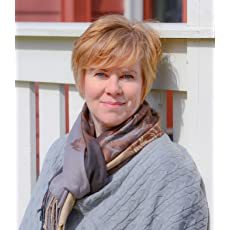 Heidi Eljarbo grew up in a home filled with books and artwork, and she never truly imagined she would do anything other than write and paint. She studied art, languages, and history, all of which have come in handy when working as a freelance writer, magazine journalist, and painter.After living in Canada, six US states, Japan, Switzerland, and Austria, Heidi now calls Norway home. She and her husband have a total of nine children, thirteen grandchildren—so far—in addition to a bouncy Wheaten Terrier.
Heidi Eljarbo grew up in a home filled with books and artwork, and she never truly imagined she would do anything other than write and paint. She studied art, languages, and history, all of which have come in handy when working as a freelance writer, magazine journalist, and painter.After living in Canada, six US states, Japan, Switzerland, and Austria, Heidi now calls Norway home. She and her husband have a total of nine children, thirteen grandchildren—so far—in addition to a bouncy Wheaten Terrier.The family’s chosen retreat is a mountain cabin, where they hike in the summertime and ski the vast, white terrain during winter.
Heidi’s favorites are her family, God's beautiful nature, and the word whimsical.
Connect with Heidi: Website • Instagram • Facebook • Pinterest • Twitter.
Published on May 11, 2020 20:00
May 10, 2020
#BookReview — Seraphina's Song by Kathryn Gauci #HistoricalFiction #Greece @KathrynGauci

Seraphina's SongBy Kathryn Gauci
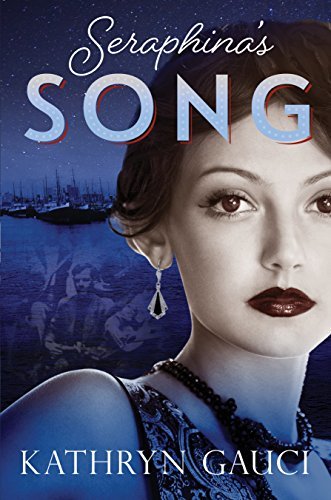
“If I knew then, dear reader, what I know now, I should have turned on my heels and left. But I stood transfixed on the beautiful image of Seraphina. In that moment my fate was sealed.”
A refugee who escapes Smyrna in 1922 disguised as an old woman. Alienated and plagued by remorse, he spirals into poverty and seeks solace in the hashish dens of Piraeus.
When he can go no lower, opportunity knocks, and Dionysos’ meets Aleko, an expert bouzouki player, recognising a rare musical talent, Aleko offers to teach him to play.
But Dionysos’ hope for a better life unravels when he meets Seraphina — the singer with the voice of a nightingale. From that moment his life is in danger and there is no going back.

"It is strange how we human beings are attracted to the things which are no good for us…"
It wasn't meant to be like this. My life was planned. I would take over my father's business and marry Rosa. But then the army of the Hellenes were defeated, and the governor of Smyrna fled, leaving us at the mercy of the Turks, and all of my dreams, all of my plans, quickly evaporated into nothing.
I thought I had died that day, along with my parents. I thought I was already dead when I reached Piraeus, but little did I know what the future had in store for me. Before I died, I had to fall in love...
From the depths of despairing poverty to the ultimate sacrifice, Seraphina's Song by Kathryn Gauci is the powerfully emotional account of a refugee who dared to love where he should not.
With a tragic sense of foreshadowing, this novel opens on a rubbish heap — a place where the desperately poor rummage in the hope of finding coins, or something useful to salvage. It is also where the dead, who had met with an unfortunate end, are left to the mercy of the dogs and the flies and the filth. It is where things are thrown away, including a life that had promised so very much. This destitute abode is a fitting place to start a novel about a man who saw the sun but wanted more — Dionysos Mavroulis wanted the stars as well.
With an enthralling sense of time and place, Gauci has presented her readers with an utterly irresistible novel. This is the kind of book that grabs the reader from the opening sentence and does not let go until that final full stop. It is a story that is hauntingly beautiful. This compelling, page-turning narrative is, at times, profoundly unsettling as the blade draws ever nearer to the brave protagonist's throat. Although Gauci prepares her readers for the death of the protagonist from the opening page, when it happens — how it happens — still comes as a tremendous shock, so be prepared and have a box of tissues close at hand.
The hero of this desperate tragedy is Dionysos Mavroulis. Gauci depicts an unlikely hero in Dionysos, for he is nothing. He is no one. A coward, some might say, who disguised himself as an old woman so he could board the boat with the other refugees. Racked with grief and guilt, Dionysos is a character seemingly without hope, but his story is one of redemption, discovery, friendship, happiness, and love. I absolutely adored Dionysos. When his life spirals out of control, it is music that saves his soul. And when he wants to say things that cannot be said, he lets his music talk for him. Everything he has experienced, everything he has ever felt, he expresses when he picks up a dead man's bouzouki. The joy his music brings to other people is a stark contrast to the torment of his soul. Dionysos was a character that I grew to adore. His honesty, his passion, his hunger for something more than he had, made him incredibly endearing and it reminds the reader that buried deep inside of us all is something that cannot be denied, no matter what the consequences.
The heroine of this tale is Seraphina. Seraphina is like an avalanche — beautiful to look at, but once she has you in her sights, she is impossible to outrun. With a voice that can out carol the nightingale and a body that tempts a man to sin, Seraphina draws men towards her like bees to a honeypot. However, interestingly, it is not her body, nor her voice, that first captures Dionysos' attention, but her eyes — eyes that remind him of his past love. Dionysos approached this forbidden relationship with Seraphina with the strength of a dying man's last confession. The unsurmountable odds stacked against the lovers is no deterrent, they must be together, or Dionysos will surely die. Seraphina's plight is as desperate as Dionysos', and when she is with him, Seraphina dares to dream of a different future. Seraphina's backstory is one of choice. She had a choice between abject poverty and free will. She chose to sacrifice her free will. But in doing so, she loses something of herself, something which she only finds again in Dionysos' arms. I thought Seraphina's portrayal was sublime. I enjoyed reading about her and, although she knows how this could end for Dionysos, she dares to believe in his promises.
For a story about suffering, Gauci's careful use of symbols to depict death should come as no surprise. The fact that Dionysos has to wear a dead man's clothes, and a dead man's shoes, is unsurprising, considering his situation, but he also takes up a dead man's journey and follows in his footsteps to the same catastrophic fate. I thought Gauci's very carefully crafted word building and her use of both symbols and motifs as well, for that matter, gave this book a strong foundation in which to build this hauntingly beautiful story upon.
The historical detail in this book is poetically alluring, which seems a strange thing to say when most of the story happens in the poverty-stricken slums of Piraeus, but it is true. Gauci has depicted not only the suffering but also the richness of life in the face of death and despair. Gauci has to be commended for her depiction of this era in all its suffering and deprivation. I thought the historical backdrop to this story was superbly executed. Bravo Ms Gauci. Bravo, indeed.
Seraphina's Song by Kathryn Gauci is the kind of book that wraps around your soul and leaves an impression. It is a story that is as impressive as it is brilliant. If you love quality Historical Fiction, then this book should definitely be on your 'to-read' list!
I Highly Recommend.
Review by Mary Anne Yarde.The Coffee Pot Book Club.
Pick up your copy ofSeraphina's SongAmazon UK • Amazon US
Kathryn Gauci
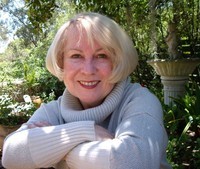 Kathryn Gauci was born in Leicestershire, England, and studied textile design at Loughborough College of Art and later at Kidderminster College of Art and Design where she specialised in carpet design and technology. After graduating, Kathryn spent a year in Vienna, Austria before moving to Greece where she worked as a carpet designer in Athens for six years. There followed another brief period in New Zealand before eventually settling in Melbourne, Australia.
Kathryn Gauci was born in Leicestershire, England, and studied textile design at Loughborough College of Art and later at Kidderminster College of Art and Design where she specialised in carpet design and technology. After graduating, Kathryn spent a year in Vienna, Austria before moving to Greece where she worked as a carpet designer in Athens for six years. There followed another brief period in New Zealand before eventually settling in Melbourne, Australia.Before turning to writing full-time, Kathryn ran her own textile design studio in Melbourne for over fifteen years, work which she enjoyed tremendously as it allowed her the luxury of travelling worldwide, often taking her off the beaten track and exploring other cultures. The Embroiderer is her first novel; a culmination of those wonderful years of design and travel, and especially of those glorious years in her youth living and working in Greece – a place that she is proud to call her spiritual home.
Her second novel, Conspiracy of Lies, is set in France during WWII. It is based on the stories of real life agents in the service of the Special Operations Executive and The Resistance under Nazi occupied Europe. To put one’s life on the line for your country in the pursuit of freedom took immense courage and many never survived. Kathryn’s interest in WWII started when she lived in Vienna and has continued ever since. She is a regular visitor to France and has spent time in several of the areas in which this novel is set.
Connect with Kathryn: Website • Twitter • Goodreads.
Published on May 10, 2020 21:30
Let’s have a sneak peek between the covers of The Road to Liberation: Trials and Triumphs of WWII (A Collection) #HistoricalFiction #WW2 #BlogTour @JJToner_ya @MarionKummerow @marosikok

Too Many Wolves in the Local WoodsBy Marina Osipova

Let’s have a sneak peek between the covers of The Road to Liberation. Below is an excerpt of Marina Osipova’s fabulous book — Too Many Wolves in the Local Woods
Excerpt
“If you already know everything about me and my family, why are you asking me all these questions?”
“Protocol demands that I should. And yes, you are right, we know everything. Interrupt me if I’m wrong.” He looked at her, not unkindly, and continued as if talking to a friend, his voice almost approving. “You were the best pupil at your elementary school, and you are now among the top students at the university. You proved yourself faithful and active first as a Pioneer and then as a Komsomol member and one of the best activists of the University’s Agitprop Brigade.” His gaze stopped for a fleeting moment on the Komsomol badge, which sat next to another, the GTO High Achiever, on her blouse.
“Your performance in athletics is astonishing. Sixty-meter sprint in nine seconds. One hundred meters in thirteen seconds. Long jump four meters ninety-five centimeters. Grenade throwing twenty meters. Well, that’s not great, but you can improve it with more practice. You are well-trained in speed skating, cross-cycle crossing, skiing, swimming.”
He has a good memory, or he prepared himself well.
“You are the best shooter in your OSOAVIAKHIM group in Engels, both with the small-bore rifle and the handgun, and from both hands at that.” He glanced at his hands and shook his head. “Astounding. I don’t know how anyone can do it.” He moved his eyes back to her.
Was there genuine admiration in them? He seemed to enjoy enumerating her successes as though they were his own. “You have made twelve parachute jumps.”
“Fourteen. Your information is not up to date.”
“Your last two jumps were not qualified.” As if she hadn’t interrupted him, he continued matter-of-factly, “And besides, I can’t help but commend you for applying for a pilot program.”
Aware that the last five minutes or so he spoke in perfect German with a slight accent she could not place—not the Volga German though—she had switched to the language too.
“I have to compliment you.”
“What for?” She arched her eyebrows, signaling her humorous surprise.
“You are quite a good actor. I liked you as the Commissar in the Optimistic Tragedy. How long were you with the school drama group?”
Had she been on their radar for six years? She calculated in her mind. “Since the fourth grade. Till I graduated. But why ask? You must have it in my dossier.”
Ignoring her sarcasm, he went on. “I have to praise your command of German. Most of your compatriots speak with such terrible accents. Do you speak German in your family?”
“Yes, with my father.”
“Franz Fridrikhovich Kriegshammer.” He shook his head as if bemused. “By now, most of the Soviet Germans have adopted Russian names.”
“People call him Franz Fyedorovich.”
“And his friends and colleagues, while visiting him, do they speak German?”
“Some do.”
“And what do they confer about?”
“I don’t eavesdrop.” Her mind turned to the image of her father’s colleagues and friends who, after a cup of tea, would proceed into his study where they continued their discussions in subdued tones, of which she could hear little.
Godyastchev’s voice broke into her reverie, “Did somebody visit your father lately? A person you hadn’t met before?”
“I don’t pay attention to who visits my father. I’m too busy.” The image of an aging man in an expensive, perfectly cut suit who showed up two weeks ago emerged in her memory. After an energetic handshake with her, he had disappeared with her father into the study. “Please close the door. It’s a confidential talk.” His voice was authoritative, in intelligent Russian. Replaying the scene in her head—was she suspected of snooping?—she felt annoyed now as she was then.
“You seem to contemplate whether you have to tell me something?”
She locked eyes with Godyastchev. “Yes. To ask why I am here?”
“I’ll answer your question later. Now, tell me how often you go to church? You are a protestant. Right?”
“I’m an atheist.”
“And your father?”
“He doesn’t go to a church either.”
“Going to a prayer service and being religious are two different things, you know?”
“He is not religious. Allow me to ask you again why all this questioning?”
“Easy, easy, Comrade Kriegshammer. Here, I ask questions.” His voice didn’t betray any irritation. “Are you acquainted with Petrushev and Ginzberg?”
“Not in person. But I’ve heard they were—”
“Yes, arrested. They disseminated anti-Soviet propaganda. By any chance, have you noticed who of your fellow students were in contact with them?”
She knew what he was getting at. “No,” she said, at the same time recalling how, on several occasions, she had spotted Rita talking to Ginzberg.
“Well.” He pushed a piece of paper across the table. “Here, you sign that you won’t divulge any information about our conversation.” He waited till she read the document and wrote her signature, then on a slip of paper, which he tore from his notepad, he scribbled something. “This is my phone number in case you have any information to share.” He looked at her from behind his glasses. She guessed she recognized something like approval as though he was sure that was not their first and last conversation. “You may go, Comrade Kriegshammer.”
Ulya breathed a sigh of relief and hastened to the auditorium, urged by the school bell ringing.“I had to fight off people to keep a reserved place in the cafeteria. Where have you been?” Rita whispered as she moved aside to let Ulya take her place beside her on the bench in the lecture hall.“I wasn’t hungry and went out to have a gulp of fresh air.”
“Attention, comrade students!” The lecturer banged the pulpit with his baton. “Today we continue on the topic of the political economy of Socialism. As our leader Comrade Stalin said in his speech at . . .”
But the lecture wasn’t on Ulya’s mind. The talk with the NKVD senior lieutenant left an unpleasant residue. What, do they expect me to become a stoolie? In my own family? Or denounce my fellow students? And instantly an unsettling thought surfaced. What has Rita in common with Ginzberg?Her friend nudged Ulya. “Hey, stop daydreaming.”
“I’ll look at your notes later.” With her photographic memory, she could allow herself to be distracted.
“Next time, you make the notes,” Rita scoffed.
While making her way to the ferry after the last lecture, Ulya felt a strange presence over her, like a cloud or a shadow. She could not help but look around while hastening to the pier yet saw only the usual citizens—the students like herself; young mothers with prams or with older children; men and women rushing on their business; teenagers, noisy and carefree.
On the boat, crossing to her town on the opposite shore of the Volga River, Ulya peered into the swamp-green waves being cut by the smart vessel for a while, before turning her gaze to the passengers. Her eyes scanned them to read their ever-somber faces. Today, those were mostly familiar people: the elderly woman with a wicker basket covered with an embroidered cotton cloth had new shoes, which seemed to trouble her since she tried to kick them off her heels; the fidgeting teenager with his ever unkempt hair seemed uncomfortable with his shaved head, now and again touching it with his hands as though wondering where his hair had gone; and the old, pockmarked man of about fifty. She would prefer not to have him staring at her with his deep set, shifty eyes, lewdly licking his lips till wet.
Who were all these people? What was on their minds? How did they feel about Lenin and Stalin? Did they idolize them? Why did some citizens disappear without a trace, while others seemed to justify the actions of the authorities? Even glorified it—at least as the newspaper articles and radio broadcasts claimed. Did she belong to the latter? The arrest of two Komsomol members from her course was the first instance that cast a cloud of doubt over her. No. No. No. She snapped at herself mentally. How could she ever question the rightness of the Soviet power? No doubt, they committed some punishable crime.
The Road to Liberation: Trials and Triumphs of WWIIA CollectionBy Marion Kummerow, Marina Osipova, Rachel Wesson, JJ Toner, Ellie Midwood, and Chrystyna Lucyk-Berger.
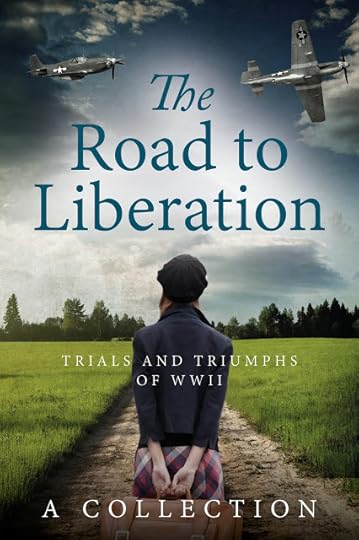
Riveting stories dedicated to celebrating the end of WWII.From USA Today, international bestselling and award-winning authors comes a collection filled with courage, betrayal, hardships and, ultimately, victory over some of the most oppressive rulers the world has ever encountered.By 1944, the Axis powers are fiercely holding on to their quickly shrinking territories.The stakes are high—on both sides:Liberators and oppressors face off in the final battles between good and evil. Only personal bravery and self-sacrifice will tip the scales when the world needs it most.Read about a small child finding unexpected friends amidst the cruelty of the concentration camps, an Auschwitz survivor working to capture a senior member of the SS, the revolt of a domestic servant hunted by the enemy, a young Jewish girl in a desperate plan to escape the Gestapo, the chaos that confused underground resistance fighters in the Soviet Union, and the difficult lives of a British family made up of displaced children..2020 marks 75 years since the world celebrated the end of WWII. These books will transport you across countries and continents during the final days, revealing the high price of freedom—and why it is still so necessary to “never forget”.
Stolen Childhood by Marion KummerowThe Aftermath by Ellie MidwoodWhen's Mummy coming? by Rachel WessonToo Many Wolves in the Local Woods by Marina OsipovaLiberation Berlin by JJ TonerMagda’s Mark by Chrystyna Lucyk-Berger
Pick up your copy ofThe Road to LiberationAmazon US • Amazon UK • Amazon CA
Marina Osipova

Marina Osipova was born in East Germany into a military family and grew up in Russia where she graduated from the Moscow State Institute of History and Archives. She also has a diploma as a German language translator from the Moscow State Institute of Foreign Languages. In Russia, she worked first in a scientific-technical institute as a translator then in a Government Ministry in the office of international relations, later for some Austrian firms. For seventeen years, she lived in the United States where she worked in a law firm. Eventually, she found her home in Austria. She is an award-winning author and a member of the Historical Novel Society.
Marion Kummerow

Marion Kummerow was born and raised in Germany, before she set out to "discover the world" and lived in various countries. In 1999 she returned to Germany and settled down in Munich where she's now living with her family.
After dipping her toes with non-fiction books, she finally tackled the project dear to her heart. UNRELENTING is the story about her grandparents, who belonged to the German resistance and fought against the Nazi regime. It's a book about resilience, love and the courage to stand up and do the right thing.
Rachel Wesson

Rachel Wesson is Irish born and bred. Drawn to reading from an early age, she started writing for publication a few years back. When she is not writing, Rachel likes to spend her time reading and playing with her three kids. Living in Dublin there are plenty of things to do, although the cowboys and Indians of her books rarely make an appearance. To chat with Rachel connect with her on Facebook - authorrachelwesson. To check out her newest releases sign up to her mailing list.
JJ Toner

My background is in Mathematics and computing, but I have been writing full time since 2005. I write short stories and novels. My novels include the bestselling WW2 spy story 'The Black Orchestra', and its three sequels, 'The Wings of the Eagle', 'A Postcard from Hamburg', and 'The Gingerbread Spy'.Many of my short stories have been published in mainstream magazines. Check out 'EGGS and Other Stories' - a collection of satirical SF stories. I was born in a cabbage patch in Ireland, and I still live here with my first wife, although a significant part of our extended family lives in Australia.
Ellie Midwood

Ellie Midwood is a USA Today bestselling and award-winning historical fiction author. She owes her interest in the history of the Second World War to her grandfather, Junior Sergeant in the 2nd Guards Tank Army of the First Belorussian Front, who began telling her about his experiences on the frontline when she was a young girl. Growing up, her interest in history only deepened and transformed from reading about the war to writing about it. After obtaining her BA in Linguistics, Ellie decided to make writing her full-time career and began working on her first full-length historical novel, "The Girl from Berlin." Ellie is continuously enriching her library with new research material and feeds her passion for WWII and Holocaust history by collecting rare memorabilia and documents.
In her free time, Ellie is a health-obsessed yoga enthusiast, neat freak, adventurer, Nazi Germany history expert, polyglot, philosopher, a proud Jew, and a doggie mama. Ellie lives in New York with her fiancé and their Chihuahua named Shark Bait.
Chrystyna Lucyk-Berger

Chrystyna Lucyk-Berger was born in Minnesota in 1969 and grew up in the culture-rich neighborhood of "Nordeast" Minneapolis. She started her writing career with short stories, travel narratives, worked as a journalist and then as a managing editor for a magazine publisher before jumping the editor's desk and pursuing her dreams of writing and traveling. In 2000, she moved to western Austria and established her own communications training company. In 2005, she self-published a historical narrative based on her relatives' personal histories and experiences in Ukraine during WWII. She has won several awards for her short stories and now primarily writes historical fiction. During a trip into northern Italy over the Reschen Pass, she stood on the edge of Reschen Lake and desperately wanted to understand how a 15th-century church tower ends up sticking out of the water. What stories were lying beneath? Some eight years later, she launched the "Reschen Valley" series with five books and a novella releasing between 2018 and 2021.For more on Chrystyna, dive in at inktreks(dot)com.
Published on May 10, 2020 21:00
Join #HistoricalFiction author, Anna Belfrage, as she explores the horrors of becoming an indentured slave #History #CivilWar @abelfrageauthor

A not-so-pleasant Caribbean cruiseBy Anna Belfrage
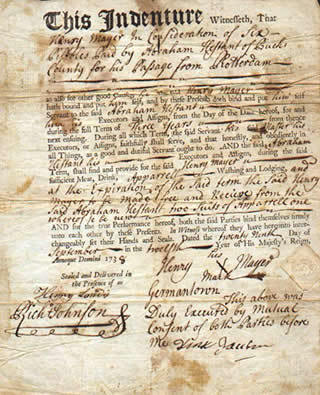
Say the West Indies, and most of us think of sun and sea, of palm trees and the soft swaying rhythm of calypso music. We don’t automatically think big business – well, beyond the fact that most of us know there are a couple of attractive tax havens in the Caribbean – but once upon a time the West Indies were a fundamental part of the global economy, part of that lucrative triangular trade in which slaves, sugar and rum were the major components.The cultivation of sugar was a jealously guarded secret. The Spanish – and Portuguese – colonists wanted to retain some sort of monopoly on this cash crop (Pernambuco in Brazil was the world’s largest sugar producer), but the commercial forces were having none of it, and as industrial espionage is was around already in historical times, the sugarcane arrived to Barbados in the 1650’s, where it went on to become the dominant crop.Those industrial spies who carried the precious sugar cane to Barbados were Sephardic Jews, since several years established in Brazil but increasingly dissatisfied with their lot in life. The Jews had been expulsed from England by Edward I in 1290 but in 1655 a representative of the Jews approached Cromwell and asked that they be allowed to settle in London. Cromwell agreed – the man had a grudge the size of an elephant when it came to Catholics, but was substantially more tolerant towards the Jews, probably because a strong Jewish community would benefit England’s trading ambitions. In Barbados, the Jews and their extensive knowledge of sugar cultivation were received with enthusiasm.Sugar is a labour intensive crop. In Pernambuco, sugar had been grown by a multitude of small free-holders, resulting in low yields and too much administration. On Barbados, a slave-based approach was implemented. The economic results were fantastic. The resulting human suffering was inexcusable.Not all slaves were black – at least not initially. Cromwell, that model of toleration vis-à-vis the Jews, had over 30 000 Irish men carried over the seas to work themselves to death under the Caribbean sun. Why? Because they were papists. Some years later, the officials of the restored monarch, Charles II, sent off boatloads of vociferous Scottish Presbyterians, condemned to servitude on the Barbadian plantations.

Sending people off to servitude was an excellent way of getting rid of unwanted peeps—even when the sugar production was primarily handled by black slaves brought over en masse from Africa. In 1686, several boatloads of prisoners of the Crown arrived in the West Indies. Their economic value was non-existent—they were too weak, too pale, to cope with the life of a slave. They were there to be punished for having participated in the Monmouth Rebellion, the idea being that they would expire on the sugar fields, worked to their limits and beyond.So who were these Monmouth rebels? In 1685 the Duke of Monmouth decided to claim the English crown, this based on the fact that he was the eldest son of the recently departed Charles II. Problem was, the Duke of Monmouth (James Scott in more informal circles) was illegitimate, even if he maintained that his parents had been secretly married. The flamboyant duke launched an invasion with the aim of overthrowing James II, the new king (and brother of Charles II). The duke hoped that his countrymen would rise in spontaneous rebellion when he landed, this due to James II being Catholic while the duke was a staunch Protestant. Didn’t happen. The rebellion failed, with several thousands of young men either executed or transported to the West Indies. Monmouth himself was executed in London—a horribly botched affair where the poor man had to suffer seven strokes of the blade before his head was finally severed from his body.
 James Scott, Duke of Monmouth
James Scott, Duke of Monmouth Charlie Graham, the Monmouth rebel depicted in Whither Thou Goest , was a young man with more passion than sense – which is how he ended up as a rebel to begin with. He had no understanding of the complex trading triangle he indirectly became a part of, all he could think about was surviving.He had no idea that his endless days on the cane fields resulted in barrels packed with raw sugar, nor did he know that these barrels ended up on Rhode Island or in England where some of them were converted to rum. Good rum, far more sophisticated than the cane liquor produced by the various stills on Barbados. That rum would travel the world, was traded for beads and for textiles that were carried to Africa by the slave traders. In Africa, the slavers loaded their holds with men and women who were born free but ended up enslaved – casualties of local wars and local greed.By the time the slavers returned to the Caribbean with their human cargo, almost a year had passed since the sugar left the island. By then, many of the slaves brought over the previous year were dead, and the off-loaded cargo was easily disposed of, angry, bewildered and frightened people subjected to being sold like animals before they were dragged off to a life that quickly became a vicious circle of too much work, too little food.No, Charlie knew nothing about the triangular trade, but he knew everything about that vicious circle. He stole, he bullied, he crawled – all to ensure he survived. There were days when he didn’t want to, when he no longer knew why he struggled so hard to stay alive.Occasionally, there were things that reminded Charlie of what it was like to be a man. Like when Mr Brown stepped from his house with a book in his hands, and Charlie recalled that he had once read for pleasure, or when the overseer sat smoking a pipe and drinking beer, and Charlie was transported back to evenings in a Dutch inn, with his friends and his hero, the now dead Duke of Monmouth. And then a sharp word would be thrown at him, and he would remember: he was a slave, a branded man, and his life was no longer his own nor would it ever be again. In such moments, he vehemently wished he could die, that the sky would open and fling a bolt of lightning to obliterate his sorry existence. But every morning he woke to yet another day of drudgery, and his heart was far too strong, his body far too young, to allow him to give up on living.
Fortunately for Charlie, he had an uncle named Matthew Graham, a man with his own bitter memories from his time as an indentured servant. Together with his wife, Alex, Matthew set off on an expedition to find Charlie – if nothing else to accord him a decent burial. That made Charlie an exception. Most of the Monmouth rebels had no one who came looking. Most of them would have died before the ten year sentence expired – except, of course, that James II was ousted and replaced by a Protestant king. The surviving rebels were pardoned and by 1691, more than half of the rebels had been freed, but with no money they remained stuck very far away from home. Maybe they consoled themselves with cane liquor.
These days, there is no triangular trade in which sugar becomes rum becomes slaves becomes sugar and so on. These days, Barbados is an island of golden sands and blue seas, a little slice of paradise. But if you leave the beaches and go exploring, if you take the time to visit the interior where the cane fields rustle like carpets of giant grass, chances are you may hear them, the whispered voices of the unfortunates who were yanked away from homes and loved ones to end their days as slaves.
Whither Thou Goest(The Graham Saga Book 7)By Anna Belfrage

In their rural home in the Colony of Maryland, Matthew and Alex Graham are still recovering from the awful events of the previous years when Luke Graham, Matthew’s estranged brother, asks them for a favour.
Alex has no problems whatsoever ignoring Luke’s sad plea for help. In her opinion Matthew’s brother is an evil excuse of a man who deserves whatever nasty stuff fate throws at him. Except, as Matthew points out, Luke is begging them to save his son – his misled Charlie, one of the Monmouth rebels – and can Charlie Graham be held responsible for his father’s ill deeds?
So off they go on yet another adventure, this time to the West Indies to find a young man neither of them knows but who faces imminent death on a sugar plantation, condemned to slavery for treason. The journey is hazardous and along the way Alex comes face to face with a most disturbing ghost from her previous life, a man she would much have preferred never to have met.
Time is running out for Charlie Graham, Matthew is haunted by reawakened memories of his days as an indentured servant, and then there’s the eerie Mr Brown, Charlie’s new owner, who will do anything to keep his secrets safe, anything at all.
Will Matthew deliver his nephew from imminent death? And will they ever make it back home?
Whither Thou Goest is available on Amazon and in most Audio formats.
Anna Belfrage
 Anna Belfrage combines an exciting day-job as a board of director in various listed companies with her writing endeavours. When she isn’t writing a novel, she is probably working on a post or catching up on her reading. Other than work and writing, Anna finds time to bake and drink copious amounts of tea, preferably with a chocolaty nibble on the side. And yes, now and then she is known to visit a gym as a consequence…Find out more about Anna by visiting her website, www.annabelfrage.com or her Amazon page.You can also find her on Facebook or Twitter.
Anna Belfrage combines an exciting day-job as a board of director in various listed companies with her writing endeavours. When she isn’t writing a novel, she is probably working on a post or catching up on her reading. Other than work and writing, Anna finds time to bake and drink copious amounts of tea, preferably with a chocolaty nibble on the side. And yes, now and then she is known to visit a gym as a consequence…Find out more about Anna by visiting her website, www.annabelfrage.com or her Amazon page.You can also find her on Facebook or Twitter.
Published on May 10, 2020 20:00
May 8, 2020
Least we forget.... #VEDay 75th Anniversary
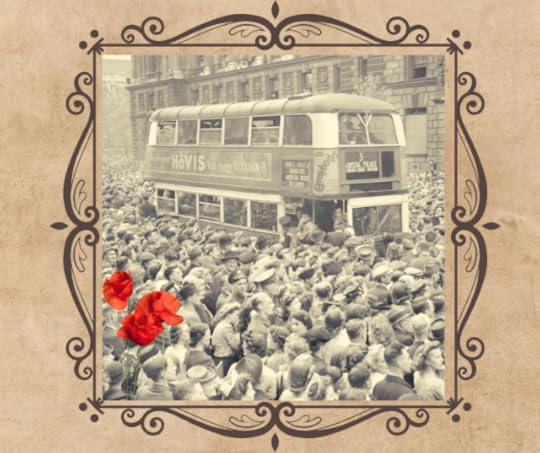
“Hostilities will end officially at one minute after midnight tonight, Tuesday, the 8th of May… We may allow ourselves a brief period of rejoicing, but let us not forget for a moment the toils and efforts that lie ahead…” Winston Churchill.

Six years of fighting on the continent. Six long years of war, suffering, fear, and unimaginably horrors had finally come to an end. Let us take a moment and think about all those who sacrificed so much in the name of freedom.
Winston Churchill announces Germany’s ’unconditional surrender’ | VE Day speech, 8th May 1945 | LBC.
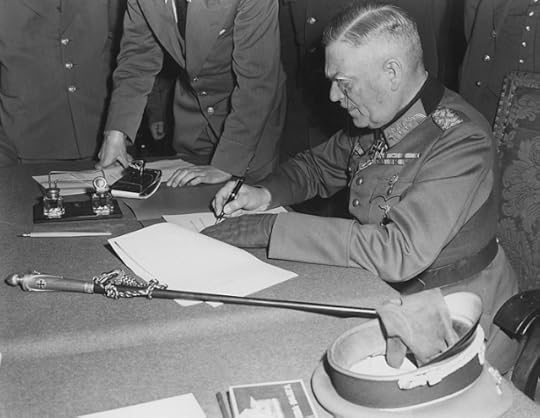 Field Marshal Wilhelm Keitel signing the final surrender terms on 8 May 1945 in Berlin. Wikipedia.
Field Marshal Wilhelm Keitel signing the final surrender terms on 8 May 1945 in Berlin. Wikipedia. Churchill waves to crowds. Wikipedia.
Churchill waves to crowds. Wikipedia.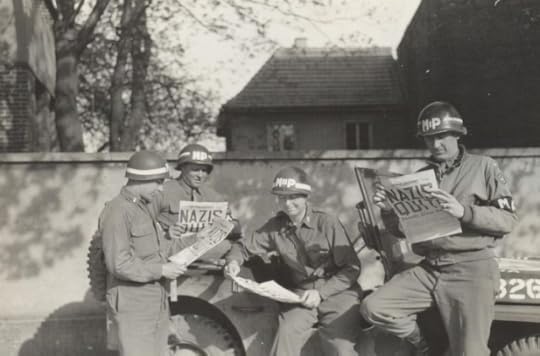 United States military policemen reading about the German surrender in the newspaper Stars and Stripes. Wikipedia.
United States military policemen reading about the German surrender in the newspaper Stars and Stripes. Wikipedia.Least we forget...
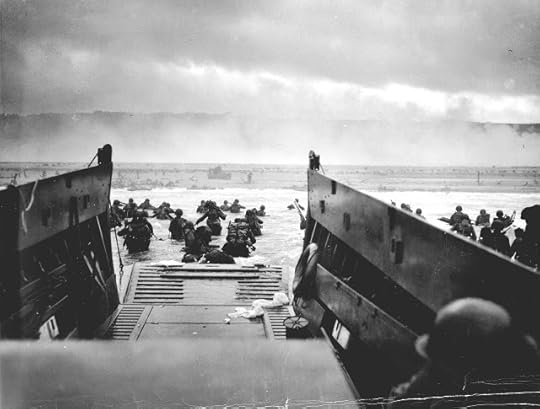 The Normandy Landings D-Day 6th June 1944
The Normandy Landings D-Day 6th June 1944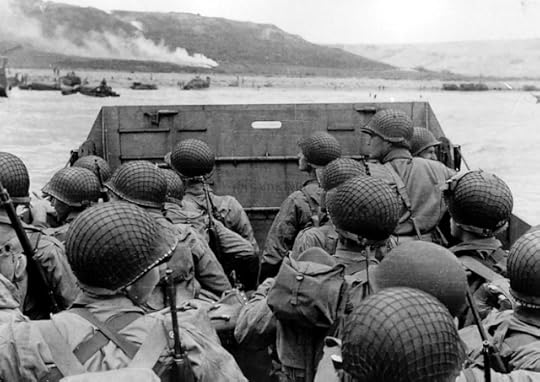 American Troops landing at Omaha Beach during the D-Day Landings
American Troops landing at Omaha Beach during the D-Day Landings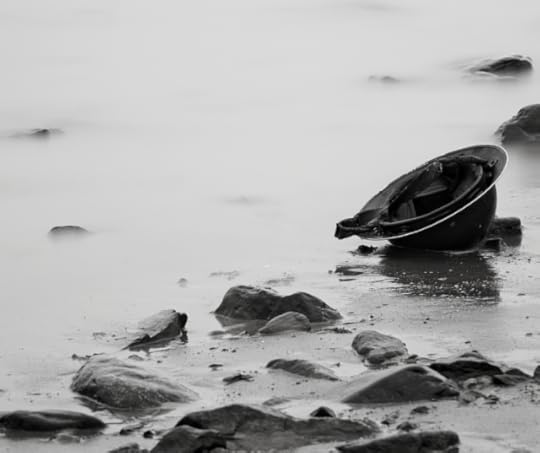

 London
London 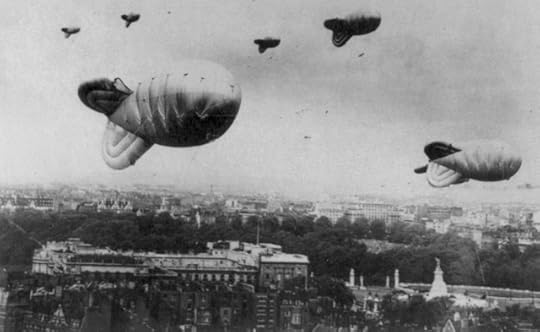 Barrage balloons flying over central London.
Barrage balloons flying over central London. 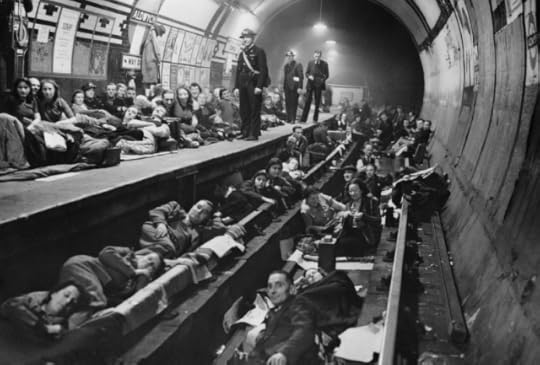 Aldwych tube station being used as a bomb shelter in 1940.
Aldwych tube station being used as a bomb shelter in 1940.  Office workers make their way to work through debris after a heavy air raid.
Office workers make their way to work through debris after a heavy air raid.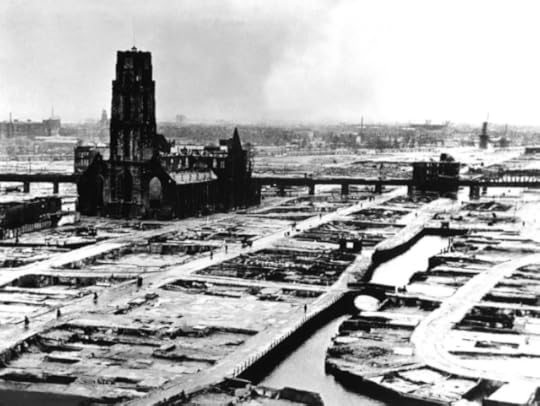 Rotterdam city centre after the bombing.
Rotterdam city centre after the bombing. Calais in ruins
Calais in ruins
 British and French troops evacuated from Dunkirk arrive at Dover.
British and French troops evacuated from Dunkirk arrive at Dover.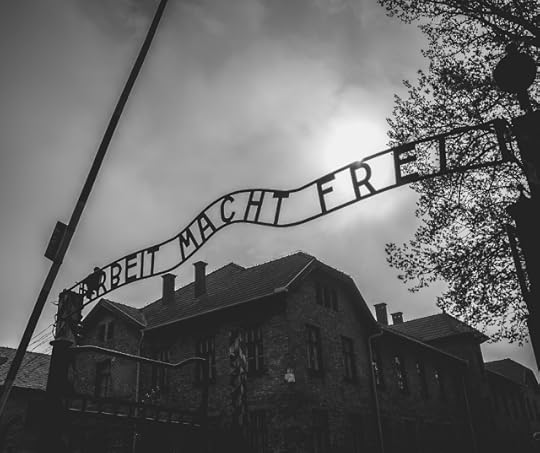 Auschwitz concentration camp.
Auschwitz concentration camp.
*All images can be found on Wikipedia, Pixabay and Canva.
Published on May 08, 2020 03:52
The Coffee Pot Book Club
The Coffee Pot Book Club (formally Myths, Legends, Books, and Coffee Pots) was founded in 2015. Our goal was to create a platform that would help Historical Fiction, Historical Romance and Historical
The Coffee Pot Book Club (formally Myths, Legends, Books, and Coffee Pots) was founded in 2015. Our goal was to create a platform that would help Historical Fiction, Historical Romance and Historical Fantasy authors promote their books and find that sometimes elusive audience. The Coffee Pot Book Club soon became the place for readers to meet new authors (both traditionally published and independently) and discover their fabulous books.
...more
...more
- Mary Anne Yarde's profile
- 159 followers



